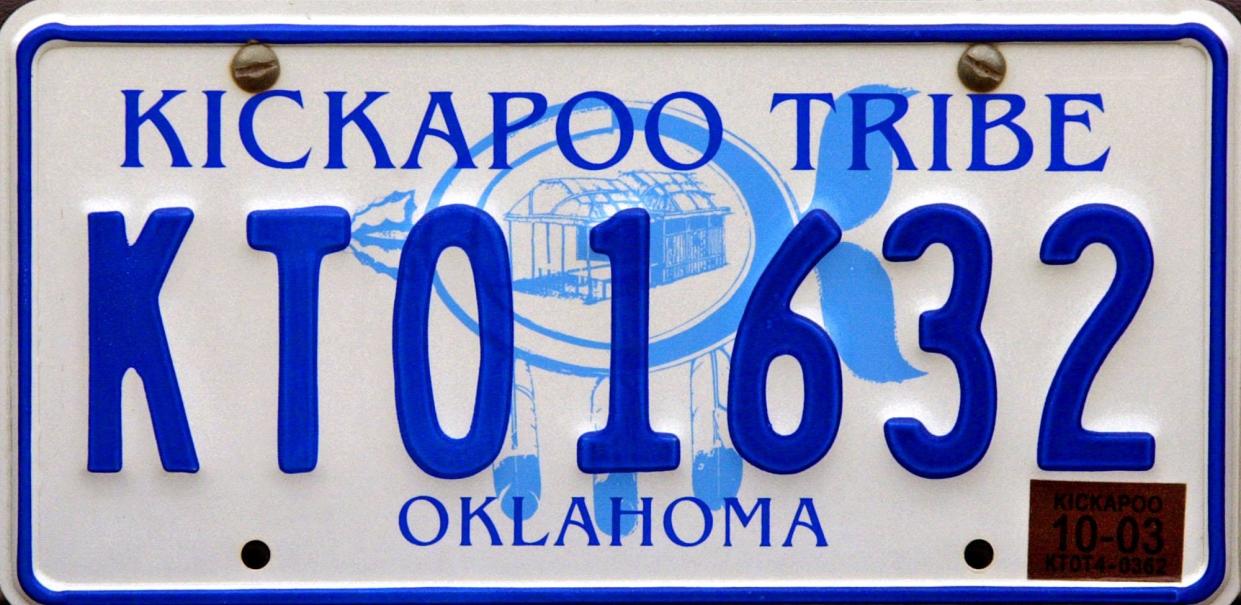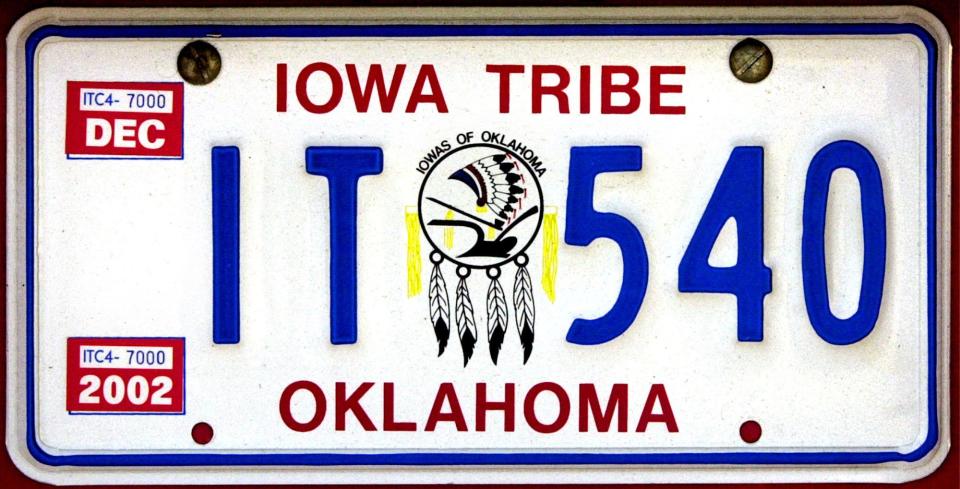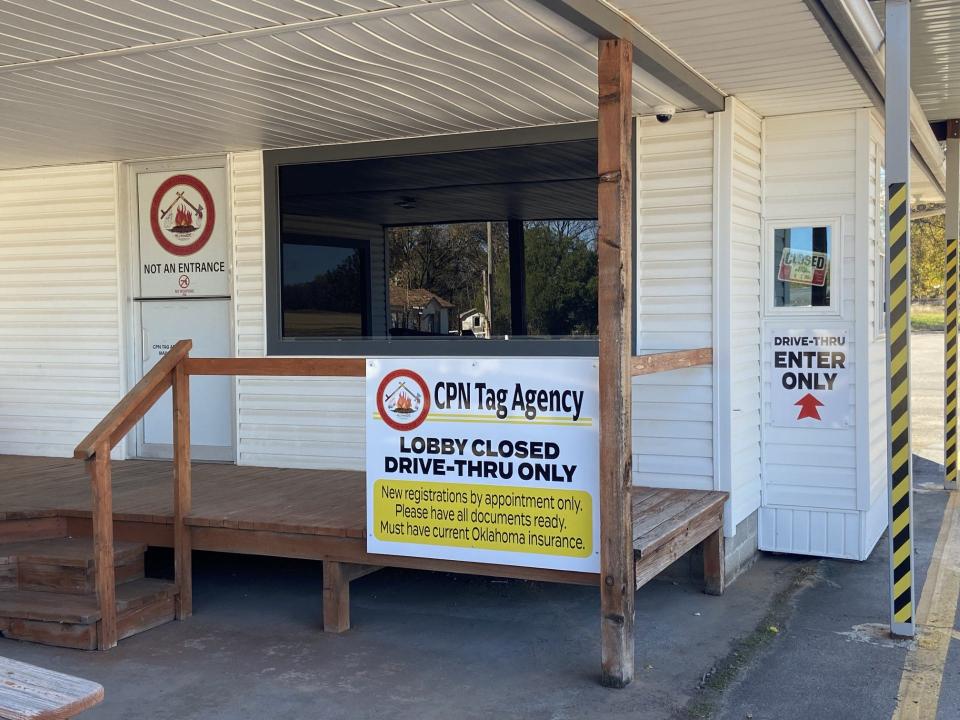Oklahoma lawmakers told state police to work out tag agreement with tribes — 12 years ago

The growing dispute over tribal vehicle tags isn’t the first time state officials have locked horns with tribal leaders over the issue.
That debate has been going on for decades. In fact, state lawmakers thought they’d found a solution to the problem 12 years ago.
At that time, state lawmakers directed the Oklahoma Department of Public Safety commissioner to figure out how the state can work with tribes to make sure officers have all tribal plate information. The law directed the commissioner to develop an intergovernmental agreement, which appears to have never happened.
An Oklahoma Highway Patrol officer wrote Crystal Deroin, an Otoe-Missouria tribal member, a ticket on Nov. 7 because her vehicle had a tribal tag and wasn’t garaged within the boundaries of the tribe’s jurisdictional area.
Deroin said she was initially stopped for speeding but received the second ticket — a $249 infraction — because of “failure to pay taxes due the state.” The ticket has left tribal officials and citizens searching for answers.
But Deroin’s story is the latest chapter in a four-decade fight between the state and tribal nations over car tags. That conflict began after the Sac and Fox Nation began issuing car tags in the early 1980s.

Four decades of disputes over tribal tags in Oklahoma
In November 1983, the state seized a car driven by Sac and Fox Principal Chief John Thorpe and tribal Tax Commission Director Truman Carter because the vehicle carried Sac and Fox tags. The car was searched and impounded.
Published accounts of the incident said the seizure “marked a state crackdown on Sac and Fox tribal members who have steadfastly refused to pay motor vehicle taxes to the state of Oklahoma.” That action prompted a $145,000 civil lawsuit by the Sac and Fox leaders against the state.
In 1984, District Judge Robert Foster ruled in favor of Carter and Gaylon Franklin, the vehicle’s owner. Foster said the tribal nation was a sovereign entity. “We have to recognize them just as we would have to recognize Great Britain or the Soviet Union,” Judge Foster said after the hearing. “If the British have the right to drive around (the United States) with their own automobile tags, I kind of feel the Indians could do the same thing.”
The decision was appealed and eventually found its way to the U.S. Supreme Court. In 1992, the high court agreed to hear the case. The court’s ruling, the Oklahoma Highway Patrol said, is the basis for Deroin’s ticket. The Supreme Court affirmed the Sac and Fox Nation had the right to issue the tags to tribal citizens whose cars garaged within its jurisdiction.
Since then, the Department of Public Safety issued a memorandum that cited the ruling and said tribal citizens must meet one of two qualifications to avoid being ticketed while displaying a tribal tag: having the vehicle garaged within the boundaries of the tribal nation or the existence of a tribal compact with the state.
A legislative attempt to resolve unregistered tribal tags in 2011
Tribal tags that do not meet those qualifications are a public safety risk and cost the state money, Department of Public Safety Commissioner Tim Tipton said. He told state lawmakers in July that unregistered tribal tags were at a critical level and only two of the 33 tribes that issue car tags provide information to the state’s vehicle license database. “I don’t know if that car’s been chased and run,” Tipton said. “I can’t get any data, any intel.”
But records show state lawmakers took steps to address those worries back in 2011.
At that time state Rep. Joe Dorman, D-Rush Springs, and state Sen. Charlie Laster, D-Shawnee, pushed through Senate Bill 857 which was designed to address the problem of state access to tribal vehicle registration. That measure, which was endorsed by the Department of Public Safety, was signed into law by then-Gov. Mary Fallin.
The bill directed the commissioner of public safety to develop a proposal for an intergovernmental cooperative agreement with all tribal governments that issue tribal license plates to collect and maintain ownership and registration information.

“The issue is authorizing a compact, if necessary, between state, county, and city law enforcement, and tribal governments so that car tag information can be accessed by law enforcement officers who are on calls or investigations where there is an automobile disabled, abandoned — whatever the case may be,” Laster, the bill’s author said in a media statement announcing the new law.
He continued: “Currently, and especially after business hours, if a city, county or state law enforcement officer needs to know if a vehicle with a tribal tag is abandoned, disabled, or stolen, the officer cannot access that information like he can on a state tagged vehicle by ‘running the tag.’ With so many tribal tagged vehicles on the road, this is a common problem that needs to be addressed.”
The bill, which was written with the help of Shawnee police officer Shawn Parson, was designed to solve the problem the Department of Public Safety is currently facing.
“Having access to tribal tag information would help city, county and state law enforcement be able to do our jobs better,” Parson said when the measure was signed by the governor. “Currently, it takes a long time for us to get the tribal tag information we need to investigate a case or we aren’t able to get any information on the tags at all because the information hasn’t been kept up to date. If we don’t have the necessary information, it’s difficult if not impossible to investigate a case.”
After the measure became law, Oklahoma Highway Patrol Maj. Rusty Rhoades, the patrol's legislative liaison at the time, said the bill would “provide the highway patrol with another opportunity to fulfil its mission of protecting the public.
“Given that there are multiple tribes that issue tags, there have been many times when troops were unable to run license plates in the middle of the night to check for stolen vehicles or wanted individuals. In future cooperatives with tribes, the Highway Patrol hopes to better identify vehicles on the roadway and enhance our public safety mission,” Rhoades said.
This article originally appeared on Oklahoman: Oklahoma lawmakers tried to address tribal tags dispute 12 years ago

